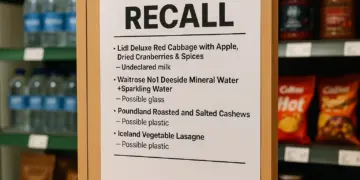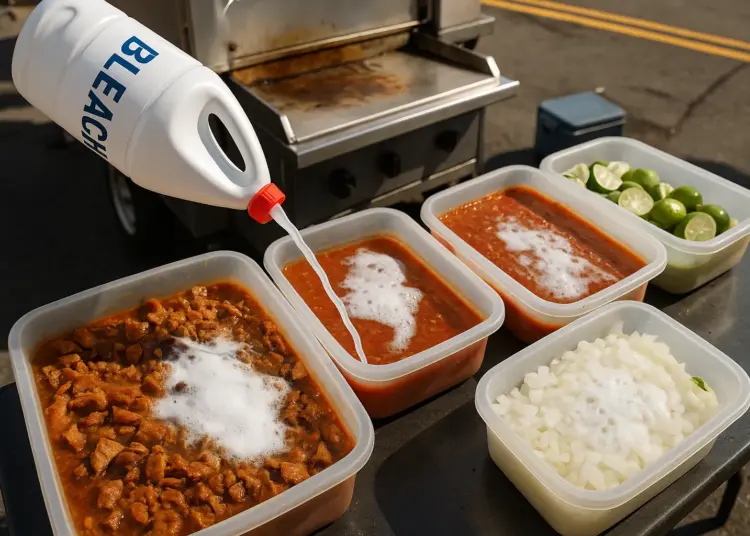Story Highlight
– Health inspector filmed pouring bleach on taco vendor’s food.
– Incident sparked nationwide debate on food safety enforcement.
– Vendor locked meat in vehicle, refused inspector access.
– Previous warnings issued to vendor for health code violations.
– Public reaction mixed; concerns over fairness in enforcement.
Full Story
A recent incident in Denver has sparked intense national discourse following the controversial actions of a health inspector during an enforcement crackdown on an unlicensed taco vendor. The dramatic event occurred on 15 November, near South Colorado Boulevard and East Evans Avenue, and was captured on video, which quickly spread across social media platforms, revealing the inspector pouring bleach over food products including marinated meat, salsa, onions, and limes.
Authorities in Denver have defended the inspector’s actions, arguing that the measures taken were necessary due to repeated violations of health regulations. They insist that the inspector followed established health-code protocols aimed at safeguarding public health.
The footage, released by Denver Today, depicts the inspector applying bleach to numerous containers of food that were prepared by the vendor, who had not secured the required licensing for food sales. The Denver Department of Public Health and Environment (DDPHE) explained that the inspector’s intention was to prevent the contaminated food from being sold or served to the public, particularly after the vendor allegedly refused to cooperate in the removal of the food for proper disposal.
According to statements from DDPHE officials, the inspector deemed it necessary to destroy the food after identifying critical safety issues. Reports suggest that the vendor had confined around 100 pounds of meat inside a vehicle to avoid inspection. The use of bleach, officials state, was considered a last resort, employed only after the vendor failed to comply with previous orders to dispose of the food voluntarily.
Health inspectors revealed that the vendor had repeatedly exhibited unsafe food handling practices, such as preparing food at improper temperatures and using a home kitchen for potentially hazardous food production. DDPHE clarified that the application of bleach is an accepted, albeit extreme, measure when faced with a non-compliant vendor who refuses to either relinquish or discard potentially contaminated food items.
The vendor’s establishment had been the subject of several warnings and cease-and-desist directives in the preceding weeks, as recorded by city officials. Inspectors visited the site multiple times, providing guidance and educational materials in both English and Spanish to support compliance efforts. A notable inspection on 28 October led to the disposal of approximately 120 pounds of meat, followed by an additional 25 pounds during a subsequent visit on 31 October. This pattern of repeated non-compliance raised alarms regarding the safety of food handled by the vendor.
By 15 November, the public health department felt compelled to intervene again after the vendor resumed operations in the same location despite prior restrictions. The choice to utilise bleach was explained by officials as a preventive action, ensuring that the food should not be sold following the vendor’s refusal to allow its removal.
Police officers who attended the scene have supported the inspector’s actions, confirming that these measures aligned with city health regulations. They did not intervene during the disposal process, affirming the necessity of the inspector’s efforts to mitigate public health risks.
Amid this controversy, reactions from the public have been markedly polarised. Some individuals have condemned the inspector’s use of bleach as an overreaction, while others have endorsed the action, arguing that it likely averted the sale of unsafe food to consumers. The narrative surrounding the events has also been complicated by unverified claims circulating online, including speculation that the inspector was previously denied free food by the vendor—though there has been no official confirmation to substantiate this assertion.
Compounding the situation, members of the community have begun to voice concerns about the perceived fairness of health enforcement practices, particularly for small or minority-owned food businesses operating without the proper licenses. Critics argue that stringent enforcement measures may disproportionately impact vulnerable vendors while potentially overlooking larger establishments that might also engage in unsafe practices.
The incident has ignited dialogues on broader themes of health regulation, food safety, and the challenges faced by vendors in navigating compliance within Denver’s food industry landscape. The DDPHE’s commitment to ensuring public health safety can raise difficult questions regarding the approaches taken in enforcement and the balance between regulatory compliance and community support. As this situation continues to unfold, community members and stakeholders alike will be watching closely, seeking a resolution that addresses the concerns of all parties involved while safeguarding public health.
Our Thoughts
To avoid the incident involving the inspector pouring bleach on food, key measures could have included better communication and education for the vendor regarding health codes and compliance. Regular training and support for unlicensed vendors before enforcement actions would help foster understanding of regulations and promote voluntary compliance, in line with Health and Safety at Work Act 1974 requirements for workplace safety and proper practices.
Relevant lessons include the importance of de-escalation techniques in conflict situations, where enforcement actions could involve community engagement before resorting to drastic measures like food destruction. This aligns with the control measures outlined in the Management of Health and Safety at Work Regulations 1999.
The breach of proper procedures can be inferred if the inspector did not adequately document steps taken prior to using bleach, which may deviate from guidelines established in the Environmental Protection Act 1990 regarding the handling of hazardous waste. To prevent similar incidents, authorities should ensure consistent and fair enforcement of regulations, focusing on education and community support for vendors to maintain hygiene and safety standards.























This incident highlights the need for clear, proportionate enforcement and better communication between inspectors and small vendors. Food safety is non negotiable, but enforcement actions must be consistent, transparent and culturally aware to avoid unfairly penalising those who may lack resources or knowledge. Providing accessible guidance, timely warnings and support for compliance will protect public health while helping small businesses meet standards without feeling targeted.